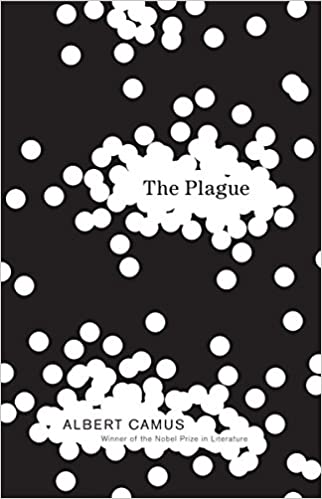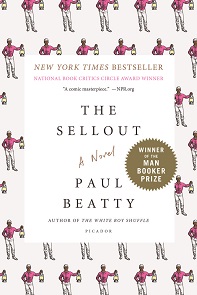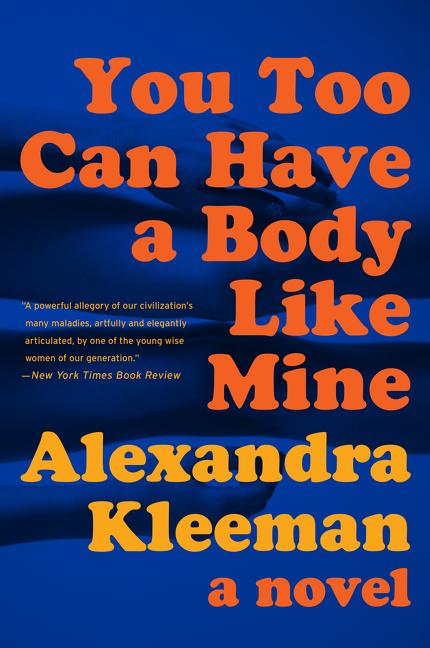What I love most about reading fiction with an absurdist bent are the moments of nonsensical meaningfulness. Often nothing is as it seems, but the murky expressions betray underlying themes, new perspectives that demand a sudden reevaluation of society’s fixations, rules, and habits and provide a chance for new interpretations and to realize our blind spots. Many of these books identify things that appear harmless or humorous now but may lead to more disruptive situations in the future. Some introduce concepts and ideas so exaggerated that we might pick up on their impact in our lives and communities as we inch closer or farther from where we’re meant to be. Still others, of course, offer the element of escapism, a place where anything feels possible, albeit absurd.

7 Absurd Books for Absurd Times
I first read this book in a college English class and have reread it several times since. It’s both funny and eye-opening, a deft and incredibly well-written attempt at showing how quickly we allow perspectives and systems to gain traction and credibility, and how all-consuming and disrupting technology can become. Jack and his family are at the center of a novel where fear of death is fought by a series of pills, warnings of an airborne toxic event result in accumulation of real or imagined symptoms, and car crash seminars and Hitler Studies classes are offered. Radios and televisions supply uninterrupted background chatter, influencing decisions, concocting alternative theories and revelations. With such distinctive and impressionable personalities, Jack, his fourth wife Babette, and their children are the perfect group with which to interpret the world DeLillo has painted.
Winner of the National Book Award, White Noise tells the story of Jack Gladney, his fourth wife, Babette, and four ultramodern offspring as they navigate the rocky passages of family life to the background babble of brand-name consumerism. When an industrial accident unleashes an “airborne toxic event,” a lethal black chemical cloud floats over their lives. The menacing cloud is a more urgent and visible version of the “white noise” engulfing the Gladneys—radio transmissions, sirens, microwaves, ultrasonic appliances, and TV murmurings—pulsing with life, yet suggesting something ominous.
MENTIONED IN:
This book opened the door to my absurdist plunge. Yes, the topic of a plague forcing residents into lockdown felt a bit too close to home on one level. But there’s something about reading a familiar experience from the perspective of a town and characters much removed from the interludes of your own mind that gives access to a new dimension, allowing for reflection, insight, and dark humor. With the passing of months, Oran’s citizens find themselves participating in thoughts and actions that may have made sense at one point (or never did at all?), plotting escape plans that go awry or were always futile (escape from what?), and engaging in conversations that both illuminate and confuse existing conditions.
I read this book while at a cabin in the woods, a place with time to really get lost in a story. Thankfully, this was a book worthy of uninterrupted reading, a cast of characters, timelines, and spaces creating a fascinating alternate world framed by a ubiquitous substance called Ubik. This 1969 sci-fi novel ranks as one of the author’s best, as unsettling as it is compelling, full of tension, mystery, and deeper meaning. A team of anti-psychics, sent to corporate offices to root out psychic spies, are met by an explosion that puts their injured leader into a “half-life” state. Events continue to unfold as a fight against the clock, the world around them beginning to transform and deteriorate in strange ways.
This might be one of my favorite books of all time, a must-read for any book lover. Appleseed, Massachusetts, is a town built on words—literally, on the pages of a book. You can have a sentence as a pet, bookworms can ruin crops and threaten communities. Inanimate objects have personalities and a Reader is inserted into the story as an active character. _____ wanders around his world in a state of uncertain isolation, making brief connections with an array of people and things, trying to locate his place in a family with a mother who’s often absent, patrolling the town with other Mothers. Quirky, metaphorical, and transportive, this book will stay with you for a long time.
THE ANSWERS is a fantastic title for a book that introduces more questions than answers, lodged in a relationship experiment deconstructing a woman’s perceived role and breaking it into segments portrayed by several participants to create the “perfect” girlfriend, including Anger Girlfriend and Maternal Girlfriend. Mary is the Emotional Girlfriend, responsible only for the idea man’s emotional needs as he remains focused on discovering the key to a lasting romance. By examining relationships in such a roundabout way, the author grants us an odd, incisive look at the way we seek out and evaluate connections, and what we think we need when in love. I can highly recommend for book clubs, as the discussion in the one that led me to this novel lasted well beyond our usual hour.
THE SELLOUT is social commentary at its best, migrating to a situation so extreme it brings egregious and unsustainable failures to light by reintroducing slavery into a California town. The narrator has lived a life he expects will turn out a certain way, even when playing his role in his father’s psychological studies, believing he’s contributing to a thoughtful exposé and memoir. Instead, his father is killed by police and the book appears nonexistent; same with the fate of his town, which California no longer wants to claim. Gaining attention by segregating his high school and appearing in front of the Supreme Court, the narrator’s actions and experiences become a kind of satirical think piece that calls for reflection and change.
If he hasn’t read it already, President Obama will likely enjoy this Man Booker Prize–winning satire, which centers around a young man’s isolated upbringing and a race trial that sends him to the Supreme Court. It’s a perfect blend of politics, civil rights, and—if you can believe it—comedy.
The book cover was what first grabbed my attention, an iridescent yet minimalistic statement offering a kind of striking ambivalence to plot and theme. Inside was a wild, spiraling ride into the mind of characters both detached and persistent, both the everywoman and no one at all. A’s roommate B has a habit of copying her appearance and habits; her boyfriend C asks her to do things like participate in a reality dating show. Life is filled with TV advertisements and people-watching, organizations and occurrences such as the Church of the Conjoined Eater and Disappearing Dad Disorder. Amidst these sharp takes on consumerism, modernity, and priorities is the descent into a weird world that feels bolder and stranger with every page.
MENTIONED IN:
Photo credit: iStock / Svitlana Unuchko
















